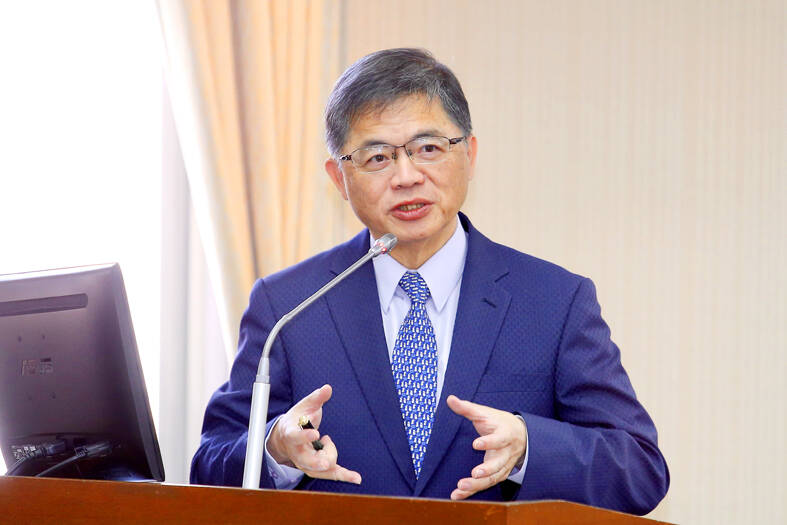The petrochemical, machine tool and steel sectors would likely be the hardest hit if China were to terminate the Economic Cooperation Framework Agreement (ECFA) or some of the early harvest lists, Executive Yuan Secretary-General Li Men-yen (李孟諺) told a meeting of the Legislative Yuan’s Internal Administration Committee yesterday.
Li’s comments came in the wake of remarks by the Chinese Ministry of Commerce that it is looking to terminate the ECFA in full or rescind some of the preferential tax rates for Taiwanese products.
Democratic Progressive Party (DPP) Legislator Chuang Jui-hsiung (莊瑞雄) asked how the government intended to respond to China setting the date to announce the results of a probe into whether Taiwan’s trade policies constitute a trade barrier one day before the legislative and presidential elections in January.

Photo: George Tsorng, Taipei Times
The government should assist Taiwanese businesspeople as it begins to reduce its reliance on Chinese trade, Chuang said.
The government has been diversifying its market over the past few years, with trade volume to countries under the New Southbound Policy doubling, while exports to China have dropped from 43 percent to 35 percent, Li said.
Fruit exports to China have dropped to 10 percent from 80 percent, he said.
China’s petrochemical industry is in full production, which could result in a situation similar to what the solar panel industry is facing, he said.
Solar panel producers have been affected by China’s actions in the past few years, he said, citing South Korea’s import surplus over the past two years.
The Ministry of Economic Affairs has worked hard to hold talks with affected industries, and the government can assist the sectors to diversify their markets while increasing production quotas, Li said.
Measures include creating niche products, such as smart products or products and services that would decrease carbon emissions, he said.
Chuang said that “China is no fool” and would weaponize the economy in response to Taiwan’s attempts to mitigate risks and exit the Chinese market.
China could restrict Taiwanese businesspeople from leaving the country, or detain them, he said.
The government should warnTaiwanese businesspeople in China and expand its efforts to provide humanitarian aid, he added.
Li said that Taiwanese businesspeople in China should be aware that Beijing is capable of “disappearing” Chinese citizens, even Alibaba Group Holding Ltd founder Jack Ma (馬雲), and imposing restrictions and auditing them.
Taiwanese in China must be on high alert, he added.

US President Donald Trump said "it’s up to" Chinese President Xi Jinping (習近平) what China does on Taiwan, but that he would be "very unhappy" with a change in the "status quo," the New York Times said in an interview published yesterday. Xi "considers it to be a part of China, and that’s up to him what he’s going to be doing," Trump told the newspaper on Wednesday. "But I’ve expressed to him that I would be very unhappy if he did that, and I don’t think he’ll do that," he added. "I hope he doesn’t do that." Trump made the comments in

NOT AN OPENING: Trump’s violation of international law does not affect China’s consideration in attacking Taiwan; Beijing lacks capability, not precedent, an official said Taiwanese officials see the US’ capture of the president of Venezuela as a powerful deterrent to Beijing’s aggression and a timely reminder of the US’ ability to defeat militaries equipped with Chinese-made weapons. The strikes that toppled Venezuelan President Nicolas Maduro signaled to authoritarian leaders, including Chinese President Xi Jinping (習近平), US President Donald Trump’s willingness to use military might for international affairs core to US interests, one senior official in Taipei’s security circle said. That reassured Taiwan, the person said. Taipei has also dismissed the idea that Trump’s apparent violation of international law could embolden Beijing, said the official, who was not

A cold surge advisory was today issued for 18 cities and counties across Taiwan, with temperatures of below 10°C forecast during the day and into tonight, the Central Weather Administration (CWA) said. New Taipei City, Taipei, Taoyuan and Hsinchu, Miaoli and Yilan counties are expected to experience sustained temperatures of 10°C or lower, the CWA said. Temperatures are likely to temporarily drop below 10°C in most other areas, except Taitung, Pingtung, Penghu and Lienchiang (Matsu) counties, CWA data showed. The cold weather is being caused by a strong continental cold air mass, combined with radiative cooling, a process in which heat escapes from

Snow this morning fell on Alishan for the first time in seven years, as a strong continental cold air mass sent temperatures plunging across Taiwan, the Central Weather Administration (CWA) said. The Alishan weather station, located at an elevation of about 2,200m in central Taiwan, recorded snowfall from 8:55am to 9:15am, when the temperature dropped to about 1°C, the CWA said. With increased moisture and low temperatures in the high-altitude Alishan area, the conditions were favorable for snow, CWA forecaster Tsai Yi-chi (蔡伊其) said. The last time snow fell at the Alishan weather station was on Jan. 10, 2018, while graupel fell there